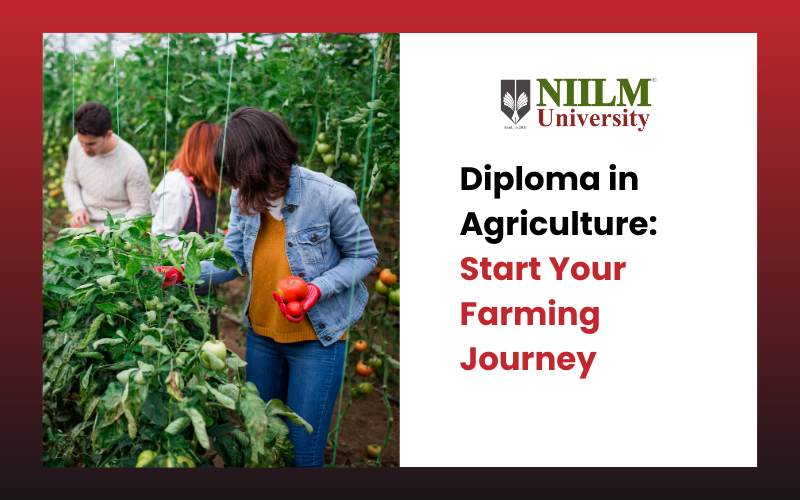Admission Enquiry

NIILM University's Diploma in Agriculture can help you get started in the agricultural industry. Discover how to farm sustainably and with modern methods
The foundation of many economies worldwide is agriculture. It's a field encompassing science, technology, and business, not just farming. More than ever, the agricultural industry is vital given the expanding global population and rising food demand. But how can one begin a career in this important field? A diploma in agriculture could be the ideal starting point for you.
Why Choose a Diploma in Agriculture?
Growing Demand for Agricultural Professionals
The necessity for food production rises with the global population. There is now a great need for qualified agricultural specialists that can innovate and enhance farming methods due to this growing demand.
Versatile Career Opportunities
A diploma in agriculture provides access to a range of employment options. This credential gives you the knowledge and abilities you need to be successful whether your goal is to manage a farm, work in agricultural consulting, or do research and development.
Diploma in Agriculture Subjects
Principles of Agronomy: Introduction to agronomy, crop production, and sustainable agricultural practices.
Soil Science: Study of soil properties, soil fertility, and soil management practices.
Plant Pathology: Understanding plant diseases, their causes, and methods of control.
Horticulture: Principles of fruit, vegetable, and ornamental plant cultivation.
Agricultural Economics: Basic economic principles related to agriculture, farm management, and agricultural marketing.
Agricultural Engineering: Introduction to farm machinery, irrigation systems, and post-harvest technology.
Entomology: Study of insects and pest management in agriculture.
Animal Husbandry: Basics of livestock management, breeding, and dairy farming.
Crop Production: Detailed study of different crops, their growing conditions, and management practices.
Weed Management: Identification and control of weeds in agricultural fields.
Farm Management: Techniques for efficient farm planning and management.
Agroforestry: Integration of trees and shrubs into agricultural landscapes for sustainable farming.
Skills You Will Acquire
Technical Skills
You will gain knowledge of crop management, pest control, and contemporary farming methods. These technical abilities are necessary for profitable and successful farming..
Managerial Skills
Agriculture involves more than just planting and harvesting; it also entails resource and personnel management. You'll get the managerial abilities needed to successfully operate a farm or other agricultural enterprise.
Career Opportunities after Diploma in Agriculture
Farm Management
You can run operations for larger agricultural companies or manage your own farm with a diploma. Planning, organizing, and overseeing every facet of agricultural output are all part of this job.
Agricultural Consultancy
As an agricultural consultant, you will provide farmers and agricultural enterprises with best practices advice, assisting them in increasing productivity and efficiency.
Research and Development
A job in agricultural research and development may be right for you if you have an innovative mindset. This career path entails researching and creating innovative farming methods and innovations.
Future Trends in Agriculture
Sustainable Farming Practices
Sustainability is becoming increasingly important in agriculture. Techniques such as organic farming, crop rotation, and reduced chemical usage are gaining popularity.
Technological Innovations
From drones to AI, technology is transforming agriculture. Staying updated with the latest innovations can give you a competitive edge in the field.
Benefits of Pursuing a Diploma in Agriculture
Hands-on Learning
A big component of agricultural education is practical experience. You'll acquire practical abilities that are immediately useful in the field.
Networking Opportunities
You will network with classmates and professionals during your studies who may prove to be important contacts for your future employment.
Contribution to Food Security
A job in agriculture will help ensure the availability of food for everyone on the planet. Your efforts can guarantee that communities everywhere have access to enough food that is safe and nourishing.
Challenges in the Field
Climate Change
Climate change poses a significant challenge to agriculture. Changing weather patterns can affect crop yields and farming practices.
Market Fluctuations
Agricultural markets can be unpredictable. Prices for crops and livestock can fluctuate, impacting farmers' income and financial stability.
Conclusion
In conclusion, if you want to work in agriculture, getting a Diploma in Agriculture is a great place to start. It provides extensive training, real-world experience, and a wide range of career options. This diploma can help you reach your objectives, whether you're interested in agricultural research, have a strong desire to improve food security, or both.
Frequently Asked Questions (FAQs)
Q1.What is the duration of a Diploma in Agriculture?
A1. Typically, a Diploma in Agriculture program lasts for 1 to 2 years, depending on the institution and the specific curriculum.
Q2. Can I pursue a Diploma in Agriculture online?
A2. Yes, several institutions offer online programs that provide flexibility and convenience for students who cannot attend on-campus classes.
Q3. What are the job prospects after completing this diploma?
A3. Graduates can pursue careers in farm management, agricultural consultancy, research and development, and many other fields within the agricultural sector.
Q4. Is prior farming experience necessary?
A4. No, prior farming experience is not required. The diploma program is designed to provide all the necessary knowledge and skills, even for those new to agriculture.
Q5. What is the average salary of a diploma holder in agriculture?
A5. Salaries can vary widely based on the specific career path and location, but diploma holders can expect to earn competitive wages in various roles within the agricultural industry.
Copyrights © 2024 NIILM UNIVERSITY. All rights reserved.